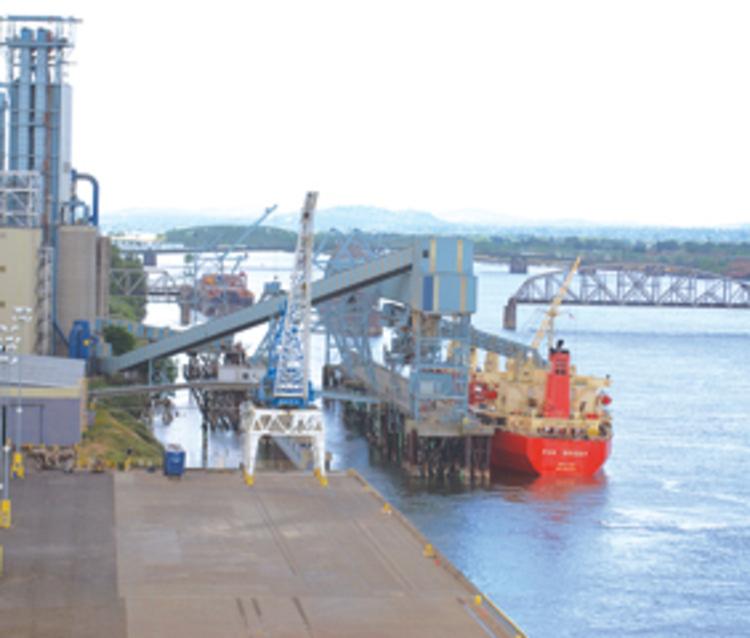forum
library
tutorial
contact

Vancouver Port Lands $72M Deal
by Erik SiemersPortland Business Journal, January 14, 2011
|
the film forum library tutorial contact |

|
Vancouver Port Lands $72M Dealby Erik SiemersPortland Business Journal, January 14, 2011 |
Wheat accounts for 73 percent of the Vancouver Port's export cargo.
 United Grain Corp. is proposing a $72 million expansion of its Port of Vancouver USA grain terminal that could nearly double the port's already sizable grain exports.
United Grain Corp. is proposing a $72 million expansion of its Port of Vancouver USA grain terminal that could nearly double the port's already sizable grain exports.
Port commissioners on Tuesday signed off on demolishing three buildings on the port's Terminal 2, paving the way for Portland-based United Grain to expand its grain terminal on that site.
Mitsui & Co. Ltd., the Japanese trading house that owns United Grain, said in a news release last month that the project should be complete by summer 2012.
Today the United Grain terminal ships only wheat.
Of the port's 4.1 million tons of export cargo in 2009, 73 percent came from wheat, accounting for 16 percent of the nation's wheat exports, according to port spokeswoman Theresa Wagner.
The United Grain expansion would add corn and soybeans to the mix, providing an additional 60,000 tons of storage space while growing the facility's total annual volume by 2 million tons.
Tony Flagg, United Grain's president, wasn't available for comment Wednesday. In a news release issued by the port, he cited the recently completed project to deepen the Columbia River channel from 40 feet to 43 feet as a major reason for the proposed expansion.
The additional three feet of depth allows ships calling the port to take on 7,200 more tons of grain than before.
The United Grain development would be the fourth major project announced in the past year-and-a-half to increase the region's grain export capacity.
In June 2009, St. Louis-based grain exporter Bunge North America announced plans to build a new $200 million terminal at the Port of Longview, Wash., as part of a joint venture with Japan-based Itochu Corp., and Korea-based STX Pan Ocean Co.
Two days later, United Harvest LLC, a joint venture between United Grain and St. Paul, Minn.-based CHS Inc., unveiled plans to double the inbound rail capacity at its grain export terminal in Kalama, Wash.
At the time, the Kalama expansion was described as one phase of a three-part modernization of the terminal.
The companies last month said they would dissolve the United Harvest joint venture, with CHS retaining ownership of the Kalama facility.
In February, Kalama Export Co., a group of grain companies operating at the Port of Kalama, Wash., announced plans to expand a grain export facility at the port, adding 180 jobs.
The company was formed by Archer Daniels Midland Co., Gavilon Grain LLC and Agrex Inc.
At the time of the announcement, its plans called for expanding the existing 95,000-metric-ton grain-handling facility by adding an additional 21,000 metric tons of grain storage and greater vessel-loading capacity.
Overall capacity would expand by 25 percent, with work expected to be complete by this spring.
The terminal build-outs come amid a worldwide surge in demand for grains, particularly in Asia.
Mitsui, in a news release, said the Vancouver expansion will not only increase trading volume, but "secure a stable supply of U.S. grain mainly to the Asian market."
Wagner said the channel deepening along with port investments -- specifically its $137 million West Vancouver Freight Access project -- are proving their worth.
In addition to the United Grain expansion, the port in August said global mining giant BHP Billiton Ltd. selected its Terminal 5 as the site for a new potash export facility.
The potash facility, which isn't expected to start operations until 2015, is expected to eventually handle around 8 million tons of potash, a potassium-based commodity used as a fertilizer to improve crop yields.
The BHP Billiton project, combined with the United Grain expansion, would bring the port's export volumes to around 15 million tons, a 265 percent increase.
"Those investments we're making in rail and in rivers not only attract BHP Billiton but allows existing tenants like (United Grain) to expand," Wagner said. "For us, that's been our goal."
Fast Fact: Wheat is by far the Port of Vancouver's largest export commodity.
Related Pages:
Cargill, Louis Dreyfus Combine River Assets by Scott A. Yates, Capital Press, 10/19/1
learn more on topics covered in the film
see the video
read the script
learn the songs
discussion forum
